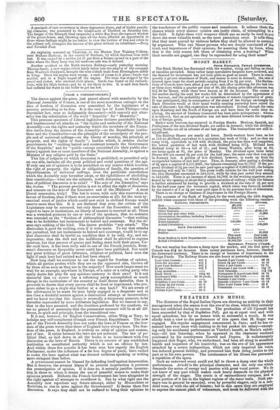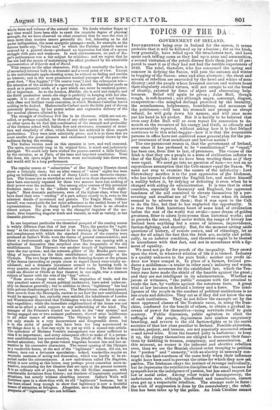THEATRES AND MUSIC.
The directors of the Royal Italian Opera are showing an activity in their management when the season is on the eve of its close, which they certainly have not exhibited during its course. The production of Gil Ugonotti has been succeeded by that of Guglielnw Tell; got up at equal cost and with equal splendour, but by no means with so successful a result. It was chiefly with a view to the performance of this opera that M. Roger was engaged. His regular engagement commenced in June; and be has re- mained here ever since with nothing to do but pocket his salary—except- ing only his accidental performance at Viardors benefit, as Mario's substi- tute—till last Saturday, when he appeared in the character rendered celebrated by his countrymen Nourrit and Duprez. It unfortunately happened that Roger, who, we understand, had been all along in excellent health and impatient of his inactivity, was on the eve of his appearance attacked by a severe indisposition, which not only impaired his voice, but induced general debility, and prevented him from doing justice to the part or to his own powers. The continuance of his illness has prevented a repetition of the opera. Such an untoward event could not fail to throw a damp over the whole performance. Arnold is the principal character, and the only one which demands the union of energy and passion with great vocal power. We do not know of any part which makes such heavy demands on the physical strength of the singer. The music is of extraordinary compass, and a great portion of it lies in the highest regions of the tenor scale. Such pas- sages can in general be executed, even by powerful singers, only in a sub- dued tone, or with the aid of falsetto; but in this opera they are employed to express the utmost pitch of vehemence, and must be delivered with the
whole force and volume of the natural voice. We doubt whether Roger at any time would have been able to exert the requisite degree of physical strength, for we have observed on other occasions that he uses the voce di testa more than modern tenors generally do; but, labouring as he did under indisposition, the most energetic passages—such, for example, as the famous battle-cry, "Salves moi, to which the Parisian parterre used to respond by a general shout—produced no impression but that of a severe struggle with pain and weakness. In such circumstances, no part of Ro- ger's performance was a fair subject for criticism; and we regret that he has not had the means of maintaining the effect produced by his admirable representation of Edgardo and of .Raoul.
With respect to the other characters, Tell, though nominally the hero, is of secondary interest both in a dramatic and a vocal point of view. Except in the melodramatic apple-shooting scene, he evinces no feeling and excites no interest; and in the most prominent musical passages of the part—the great duet, "Non fuggire," ("Oft mires vous,") and the subsequent trio— the attention of the audience is engrossed by Arnold. Tamburini made as much as is generally made of a part which can never be rendered power- ful or important. As to the heroine, Matilda, she is cold and insipid; and the florid passionless music she sings is perfectly in keeping with her cha- sadists it is one of those parts, demanding personal grace; and beauty, with clear and brilliant vocal execution in which Madame Castellan leaves nothing tO be desired. Mademoiselle COrbari made the little part: of Jemmy extremely pleasing, by her pretty action and expressive delivery of the few musical phrases allotted to her.
The strength of Guillaume Tell lies in its choruses; which are not ex- celled, or perhaps equalled, by those of any other opera in existence. In no other opera do we find that combination of the strength and profundity of the German school with Italian flow and sweetness, symmetry of struc- ture and simplicity of effect, which Rossini has achieved in these superb productions. They were most admirably given; and it is to them that we must ascribe the great pleasure and excitement frequently shown by the audience during the evening. The Italian version used on this occasion is new, and well executed. The opera, enormously long in its original form, is much and judiciously abridged. We could only have wished the process carried a little further, by the omission, as at Paris, of the lame and impotent conclusion. Were this done, the opera might be thrown most conveniently into three acts, and would still be a long performance.



























 Previous page
Previous page